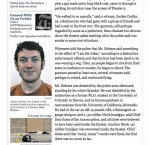Starbuck
Well-known member
- Joined
- Aug 28, 2013
- Messages
- 881
- Reaction score
- 255
- Gender
- Male
- Political Leaning
- Other
Are you an honest person?
Probably as honest as the next.
Yes. I can tell the rabid dogs who loot and burn that they are wrong. It is really easy if one is actually a thinking, reasoning man. They need to be destroyed as a blight. And maybe, just maybe you need to man up.
In being honest, I'm honestly a little confused with the above statement.
Are you simply suggesting that we look for those in the crowds that are causing the violence and separate them from the overwhelming majority of peaceful protesters?
It is true that The One, the Father of Lies, has abused the black community. Therefore what? Until those who have darker skins begin to realize that their allegiance, for no particular reason, to the Democratic party has harmed them, and that they do have options, they will continue to be oppressed.
Blacks murder blacks. Who is oppressing whom?
Well, in this country I'd argue that systemic and institutionalized racism is allowing at least several primary groups of minorities to be very oppressed.


